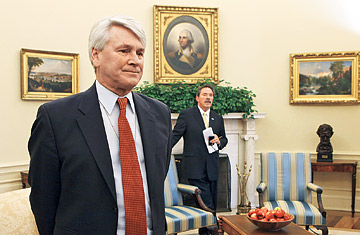
Obama turned to Craig to roll back Bush-era policies in the war on terrorism. But by September, Craig had been sidelined by pragmatists.
(4 of 5)
On April 17, Craig took the first step, assembling officials from across government in his office. Not only was he going to bring some prisoners from Guantánamo Bay to the U.S. for trial, he told them, but he was also going to turn some of the detainees loose. Seventeen were Uighurs, members of an ethnic minority from northwestern China, whom Bush and the courts judged had been wrongly swept up in Afghanistan and Pakistan after 9/11. Obama's top national-security advisers--including Gates, Secretary of State Hillary Clinton and others--had approved Craig's plan to release two Uighurs in northern Virginia.
The move was part of a global game to empty the prison. If the two settled without incident, six more would be let into the U.S. That in turn would help the State Department persuade other countries to take Gitmo detainees. The hope was that those remaining could be tried in federal courts. At the April 17 meeting, Craig directed some of the officials to plan security measures for monitoring the Uighurs once they got to the U.S. and others to develop a plan to convince Congress and the public that it was a good idea. The Uighurs' lawyers agreed to a number of intrusive measures, including ankle bracelets, to assuage security concerns. "It was a matter of days, not weeks," until the Uighurs would arrive, says a top Defense official.
But inside the White House, the mood had changed amid the furor over the release of the torture memos in April. McDonough and other NSC advisers assembled in the Oval Office to discuss it. Obama raised questions about security--were the FBI and the Department of Homeland Security on board? Separately, his legislative-affairs staff warned of stiff congressional resistance--and Republicans responded on cue. Word of the plan leaked on April 24, and Senate minority leader Mitch McConnell launched three weeks of near daily attacks on the idea of letting the Uighurs loose in the U.S. Dick Durbin, Obama's mentor and the Democrats' No. 2 in the Senate, called the White House asking for ammunition to fight back against McConnell and the Republicans. "What's our plan?" Durbin asked.
Unwilling to execute Craig's plan, the White House had no backup. Though Durbin thought it could win the fight, Obama's political team worried about antagonizing lawmakers at a time when the President was seeking more money for Iraq and Afghanistan as well as a host of economic concerns. "The precincts were reporting that there was going to be stiff opposition" to Craig's Guantánamo plan, says a top official. It became "a question of what is achievable," he adds.
Obama quietly killed the Gitmo plan in the second week of May; Craig never got a chance to argue the case to the President. "It was a political decision, to put it bluntly," says an aide. The stumble had long-term consequences: later that month, Congress blocked the release of Guantánamo detainees in the U.S. and restricted their transfer there for trial. The White House realized it had to start over on a signature issue.
The Final Days of Greg Craig
